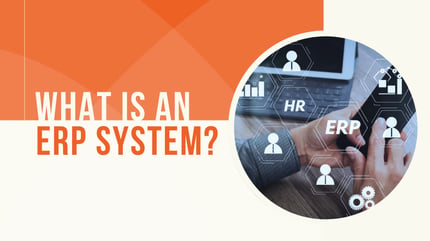
Nowadays, there are thousands of software and application providers for businesses, offering everything from niche operational tools to full suites for departments and entire companies. Advances in cloud computing have played a major role in the development of all these application-based business solutions.
Large enterprise companies have a variety of these applications across departments and even within a single department in order to compete in an increasingly digital world. However, multiple solutions from different providers don’t always connect and communicate with each other, creating data discrepancies, inconsistent practices across the company, and departmental silos of information.
ERP systems are a solution to help large enterprises achieve accuracy, consistency, and agility across their business. And with cloud-based providers, there’s no need for time consuming updates or extra costs to manage databases on-site.
ERP Defined
ERP, or enterprise resource planning, is an integrated system that combines a company’s main business processes and pulls information in real time from a central database. While ERP systems can be on-site or cloud-based, there are a few functional requirements of ERP:
- ERPs must be integrated systems
- They must operate in real time or near real time
- One common database supports all modules
- Modules have a consistent look and feel
ERP combines earlier manufacturing and business processes, material requirements planning and manufacturing resource planning, with computer-integrated manufacturing. ERP isn’t a replacement of any one of these processes, but a combination of them all to represent a larger whole. While some EPR systems are designed with functionality specific to certain types of businesses, like manufacturers, they address all the core functions of an enterprise company.
The Function of ERP
An ERP system is integrated into every part of your company. ERP systems have a set of “modules” that offer specific functions for each department. Not all EPR systems offer the same modules, but many offer these core functionalities as well as integrations with other applications and software:
Finance & Accounting
Functionality: General ledger, fixed assets, accounts payable, cash management
Management Accounting
Functionality: Budgeting, cost management, activity based costing
Human Resources
Functionality: Recruiting, training, rostering, payroll, benefits, retirement and pensions, diversity management, separation
Manufacturing
Functionality: Engineering, bill of materials, work orders, scheduling, workflow management, quality control, process, projects, flow, product life cycle management
Ordering Process
Functionality: Order to cash, order entry, credit checking, pricing, inventory, shipping, sales analysis and reporting, sales commissioning
Supply Chain Management
Functionality: Supply chain planning, supplier scheduling, product configurator, purchasing, inventory, claim processing, warehousing
Customer Relationship Management (CRM)
Functionality: Sales and marketing, commissions, service, customer contact, call center support
Project Management
Functionality: Project planning, resource planning, project costing, work breakdown structure, billing, time and expense, performance units, activity management
Data Services
Functionality: Self-service interfaces for customers, dealers, suppliers, and employees
Business Value of ERP
Before cloud computing, ERP systems were mostly on-premises systems that were hosted on servers managed by a company’s information technology (IT) department. Now, cloud-based ERP solutions, also known as SaaS (software as a service), dominate the market. Cloud-based ERP systems provide a few specific advantages over their on-site counterparts:
- Updates happen regularly and automatically to keep pace with evolving business practices and needs. IT is no longer tasked with manually updating the system, and your business always has the most up-to-date product.
- Data is stored on secure servers and managed by data security experts.
- SaaS providers often have multiple server locations with duplicate data, adding an extra layer of data protection from natural disasters or fire.
Not only are ERP systems easier to manage and more agile with cloud computing, they’re also more affordable.
One of the main requirements of ERP is that information is pulled from a central database, meaning data is consistent across departments and operations. Product names, customer contact information, machine service records and more will be the most up-to-date and the same across all ERP modules. This leads to fewer errors and generally less confusion, as well as less time spent correcting errors and searching for the right information.
Cloud-based ERP systems often offer a core set of ERP modules and have the capability to integrate with other programs. This means if an ERP system doesn’t offer a capability your business needs, or if one department needs to keep their current software, the ERP can be integrated with other software and achieve the same consistent data throughout the company.
ERP Providers
There are plenty of cloud-based ERP Providers, but these are some of the top players:
Oracle NetSuite
Oracle’s acquisition of NetSuite has made a powerful combination of ERP platforms that features add-on functionality and strong SaaS methodology.
SAP
SAP is best for large enterprise operations, and its implementation often takes the longest out of our list; however, this is because the system is configured specifically for each company.
Microsoft
Microsoft is a good fit for smaller operations and it works well with companies already using their other products like Dynamics and Outlook.
Infor
Infor is an emerging ERP platform that has plenty configuration options and is a good fit for large companies.
IFS
IFS is good for large, international companies and features strong end-to-end functionality.
abas
abas is a good fit for small and mid-size manufacturers with assemble, make, or engineer-to-order environments.
Deltek
Deltek is flexible, offering both basic and advanced functionality and solutions suited for small to large companies.
Getting Started with ERP
Large software suites that touch every part of your company take some time to configure and integrate into your business. Implementation of an ERP can take between three and fourteen months, depending on the size of the company, any customization, and training staff. Many companies don’t implement an ERP system on their own and work with a consulting firm with ERP knowledge and experience to help configure the platform and guide the implementation.
If you think ERP might be right for your company, let’s talk.


